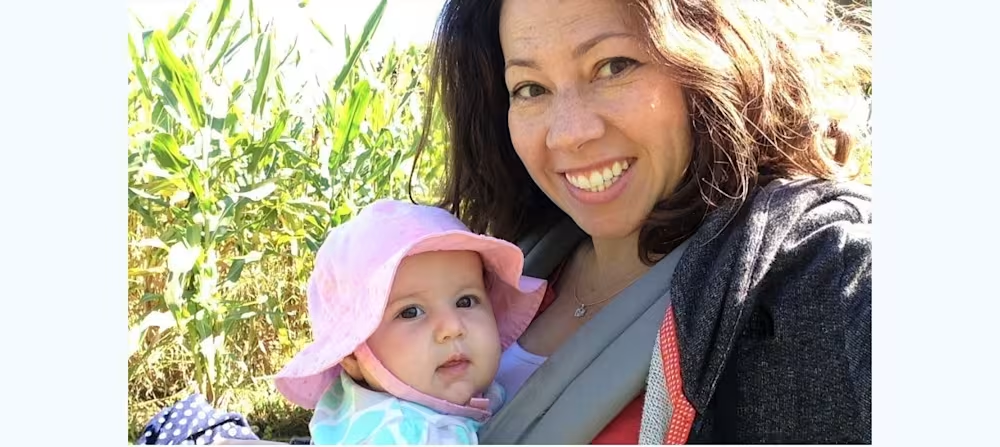Confessions of a sleep consultant with Amber LoRe
Updated Oct 16, 2025

Jessica: What was your biggest surprise when you first became a parent?
Amber: When my son was born in 2009 I didn’t know very much about baby sleep. I was under the (mistaken) assumption that babies just slept when they were tired; I never anticipated that “baby sleep” would be much of an issue, much less change the trajectory of my career.
During the newborn months, I did what I needed to do in order to help him sleep — whether that was to nurse, rock or hold him until he drifted off. It worked — until it didn’t. Around 4 months, my son started waking more at night and eventually began waking every 1-2 hours ALL NIGHT LONG.
This pattern lasted for months. Months! To make matters more challenging, naps were short and would only happen when I was holding him. Neither of us were getting quality sleep. I felt like an absolute zombie!
Jessica: What did you do about the lack of sleep?
Amber: At that point, I was unaware of the and brought my son to the doctor to rule out medical causes. My son was healthy and my pediatrician advised me to put my infant in bed at night, shut the door and come back 12 hours later no matter how much he screamed and cried.
Although I was uncomfortable with the advice, I felt desperate and tried it that night. I lasted all of three minutes before I was in tears and ran in to “rescue” him. Although the advice was well-meaning (and may work for some families), I knew going cold turkey and using full-blown “” wasn’t right for my persistent baby who was still nursing several times a night. And it definitely wasn’t right for me.
Jessica: Since cry-it-out didn’t work for you, what next?
Amber: I began to learn everything about baby sleep that I could. The books made it sounds easy — if I could just put him down “drowsy but awake” before he became over-tired, all of my problems would be solved! Of course, it wasn’t so simple. Drowsy but awake = hours of crying.
Jessica: Oh yes, the whole drowsy-but-awake thing. Much easier said than done. Did it ever get better?
Amber: After combing through all of the popular books and lots of trial and error, I eventually had our toddler sleeping well. It took a lot of time, though, and it was a lonely process.
It seemed like everyone I knew had babies that were sleeping well and they couldn’t relate to our struggle! It can be quite difficult when your family and friends can’t understand why you plan your social activities around naps and bedtime because you are absolutely desperate for sleep.
I think you have to live through that kind of sleep deprivation to appreciate just how brutal it can be on your health and well-being.
Jessica: Some say that when we go through difficult things, we are more able help other people in a similar situation. Do you feel that was the case for you?
Amber: Although those struggles were really tough, they also sent me in a new direction. I became a sleep consultant in 2011 and have never had a more fulfilling job. There is nothing better for me than helping families get more rest so that parents can find their joy again.
Parenting a baby or young child can be so rewarding, but we need our basic needs met in order to fully enjoy the experience. I don’t ever want a parent to miss out on the early years because they lacked the necessary knowledge and guidance.
After spending years working with families and challenging sleepers, I’ve learned that we’re not alone. There are so many parents across the globe going through what I went through — and going through what you’re going through.
You might feel like the only one parent battling your sleep issues, but I promise you that you’re in good company. The solutions are out there for you! If only I had known the value in getting professional help and cutting through the noise, I would have done it in a heartbeat.
Jessica: We’re so thankful that you do what you do. It must be extremely rewarding to have directly helped improve the lives of so many families. Now how about your second child’s sleep — better?
Amber: Thankfully, by the time my second child was born I had the knowledge to help her become a rock star sleeper. Of course, that’s not to say that there haven’t been regressions and challenges along the way.
Kids get sick, travel throws them off, and (despite my occasional wishes to freeze time) they continue to develop and grow. However, I now have the tools and confidence to get us back on track, no matter what life throws at us. I’m always thrilled to help other parents weather their “sleep storms” too!
Share article:
Note: The content on this site is for informational purposes only and should not replace medical advice from your doctor, pediatrician, or medical professional. If you have questions or concerns, you should contact a medical professional.
Share article:






